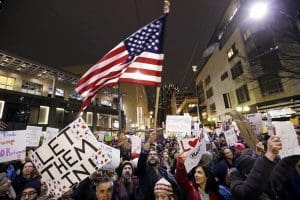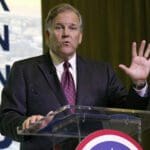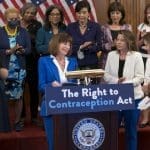Trump's Muslim ban is a failure on all fronts
Late in the afternoon on January 27th, Donald Trump signed an executive order barring nationals from seven primarily Muslim countries from entering the United States, including Iraq, Syria, Iran, Libya, Somalia, Sudan, and Yemen. As of this writing, the order has still not been posted on the White House website, but other news outlets have […]

Late in the afternoon on January 27th, Donald Trump signed an executive order barring nationals from seven primarily Muslim countries from entering the United States, including Iraq, Syria, Iran, Libya, Somalia, Sudan, and Yemen. As of this writing, the order has still not been posted on the White House website, but other news outlets have published what is said to be the full text of the order, mendaciously entitled “Protecting the Nation from Foreign Terrorist Entry into the United States.”
The 9/11 terrorist attacks are mentioned multiple times within the order as justification. However, none of the terrorists connected to those attacks were from any of the countries targeted by the ban; the majority of the 9/11 perpetrators were from Saudi Arabia, which is specifically not included in the ban.
And in addition to Saudi Arabia, notably missing from the ban are other countries where Trump is known to have business dealings:
Trump’s immigration ban excludes countries with business ties https://t.co/XEcwMJaKht pic.twitter.com/nRNNmXscMZ
— Bloomberg Politics (@bpolitics) January 26, 2017
Furthermore, the process of creating the order went through none of the interagency collaboration and consultation processes standard for actions of this type. Sources in the intelligence community noted, “Nobody in the counterterrorism community pushed for this. None of us ever asked for it.” Others pointed out such a ban would make the fight against ISIS and other Islamist extremist terrorist organizations harder and serve as recruitment propaganda for them.
Even the libertarian Cato Institute, a think tank funded by the Koch brothers, described the ban as having “little national security benefit,” and observed, “Foreigners from those seven nations have killed zero Americans in terrorist attacks on U.S. soil between 1975 and the end of 2015.”
Quickly growing in size as information about the Muslim ban became public and outrage spread, protests against the ban, especially at airports around the country, began at JFK in New York City on Saturday:
The scene from above as thousands chant and scream, draping banners from above at JFK international arrivals shouting "LET THEM IN!" pic.twitter.com/ugU8zbKYiv
— Jack Smith IV (@JackSmithIV) January 28, 2017
Lawyers gathering at JFK put out a call for action to help the unknown number of affected people being held within:
Lawyers are arriving by the dozens to JFK, taking shifts outside of international arrivals. Here's their call to action: pic.twitter.com/p34bTVKCwj
— Jack Smith IV (@JackSmithIV) January 28, 2017
Later that day, the American Civil Liberties Union took the lead in confronting the unconstitutionality of the ban by taking the issue to court. In their complaint, the ACLU challenged the ban with two named petitioners, both of whom are Iraqi men who had previously obtained visas from the United States due to their assistance of the U.S. military’s efforts in their country of birth. Both plaintiffs had been detained at JFK by U.S. Customs and Border Patrol (CBP) earlier in the day.
As the day progressed, similar legal aid activities and protests developed at airports across the country. Lawyers gathered at Chicago’s O’Hare Airport where other detainees were being held:
Attorneys have set up shop at the O'Hare McDonald's as they work to get the 18 people held out pic.twitter.com/zueaLgNVA4
— Stacy St. Clair (@StacyStClair) January 28, 2017
Just outside of Washington, D.C., Virginia Democratic Governor Terry McAuliffe and New Jersey Democratic Senator Cory Booker joined protesters:
At Dulles, with VA Governor @TerryMcAuliffe & fellow citizens. Time to stand up for American values. #RefugeesWelcome pic.twitter.com/HECBZw03fi
— Mike Breen (@M_Breen) January 28, 2017
.@CoryBooker is here at Dulles in middle of the night to make sure #Refugees can see lawyers.
That's called walking the walk.
— Mike Breen (@M_Breen) January 29, 2017
Also at Dulles in D.C., protesters included an Iraqi vet who brought his young son and four Purple Hearts with him:
Iraq vet w/ 4 Purple Hearts, drove two hours to Dulles w/ his son.
Nobody called him. He just came. Why?
"Not what I fought for." pic.twitter.com/pAe50ugtlI
— Mike Breen (@M_Breen) January 28, 2017
When one of the detainees, a woman from Iraq, was finally released, the vet gave her family one of his Purple Hearts:
This man's wife made it through customs after hours. She's Iraqi. This man in cap & his son gave them a Purple Heart pic.twitter.com/yBiaiYvgXM
— Jessica Lussenhop (@Lussenpop) January 28, 2017
Massachusetts Democratic Senator Elizabeth Warren came to join the protesters at Boston’s Logan Airport:
https://twitter.com/onekade/status/825515360132673536
Georgia Democratic Representative John Lewis showed up at Atlanta’s airport:
. @repjohnlewis after the feds declined to say how many are being detained at Atl airport: "Why don't we just sit down and stay a while." pic.twitter.com/2KLVNbEChJ
— Jeremy Redmon (@JeremyLRedmon) January 29, 2017
And in California, Democratic Representatives Judy Chu and Nanette Diaz-Barragan came to the Los Angeles airport to seek to aid those being detained.
Amidst all of these fervent protests, late Saturday evening, Judge Ann M. Donnelly of Federal District Court in Brooklyn blocked Trump’s executive order, finding in favor of the ACLU that refusing entry into the United States to those who had previously passed strict vetting for visas and other forms of immigration documentation and returning them to their countries of origin would cause “irreparable harm.” She further issued a nationwide stay, and in her order she expressly stated the unconstitutionality of the terms of the executive order, saying that “the removal of the petitioner and others similarly situated violates their rights to Due Process and Equal Protection guaranteed by the United States Constitution.”
But on Sunday, the chaos continued. White House counselor Kellyanne Conway tried to claim the order was not, in fact, a Muslim ban, while another Trump surrogate, Rudy Giuliani, admitted that Trump had asked him how to implement such a ban legally:
Giuliani says when Trump called for a "Muslim ban," he told Giuliani, "show me the right way to do it legally." https://t.co/t9mHsY15nb
— Matt Pearce 🦅🇺🇸 (@mattdpearce) January 29, 2017
The Department of Homeland Security tried to downplay the measures as affecting only a “minor” portion of overall travelers into the United States:
.@POTUS’s Executive Order affects a minor portion of int’l travelers
— Homeland Security (@DHSgov) January 29, 2017
Meanwhile, protests continued to spread and grow, with actions taking place in well over four dozen locations across the United States. From L.A. to NYC to Houston to Nashville, Americans came out to speak against the injustice of a religious test for entry into the U.S.:
To appreciate the scope, cities with #NoBanNoWall protests today include:
– Indianapolis
– Omaha
– Houston
– Nashville pic.twitter.com/84ho7nzPFi— Matt McDermott (@mattmfm) January 29, 2017
People took to the streets in Washington, D.C., to bring their grievances directly to the White House, where California Democratic Senator Kamala Harris was among those speaking out:
The scene outside of the White House. #NoBanNoWall pic.twitter.com/OqdNjAUzan
— igorvolsky (@igorvolsky) January 29, 2017
"We will not stand for this." – Senator Harris #NoBanNoWall pic.twitter.com/iM4eoFXtRq
— Lily Adams (@adamslily) January 29, 2017
Among the GOP, Senators John McCain of Arizona and Lindsey Graham of South Carolina released a joint statement characterizing Trump’s Muslim ban order as a “self-inflicted wound in the fight against terrorism.”
Nonetheless, despite the federal order staying the implementation of the ban and the voices of many in power, the CBP continued to detain people throughout the day. Virginia Democratic Representative Don Beyer referred to the actions of the CBP, which is an arm of the Executive Branch of the federal government, as a “constitutional crisis”:
We have a constitutional crisis today. Four Members of Congress asked CBP officials to enforce a federal court order and were turned away.
— Rep. Don Beyer (@RepDonBeyer) January 29, 2017
Toward the end of Sunday, DHS modified the implementation of the executive order and ruled that it did not apply to “lawful permanent residents” (aka green card holders):
Statement By Secretary John Kelly On The Entry Of Lawful Permanent Residents Into The United States → https://t.co/Es1qivoR3J pic.twitter.com/hffMK2MOQC
— Homeland Security (@DHSgov) January 29, 2017
The situation regarding the Muslim ban remains volatile and in flux, and will be subject to ongoing future litigation. However, one thing is certain: This will not be the last time the checks and balances of the federal government will be tested to their limits by the power-hungry Trump administration.
And it will also not be the last time people rise up, speak out, and fight back against such un-American acts.
Recommended

Republican Jay Ashcroft backs anti-abortion clinics that push lies and disinformation
The Republic Pregnancy Resource Center website provides step-by-step directions from local middle and high schools to their address.
By Jesse Valentine - May 14, 2024
More than half of Republican Jay Ashcroft’s funding comes from outside Missouri
Ashcroft has criticized other campaigns for relying on out-of-state donors
By Jesse Valentine - April 25, 2024
Battleground GOP candidates rally around Trump’s tax cuts for the rich
Even Larry Hogan, a Trump critic, supports the former president’s tax policy.
By Jesse Valentine - April 12, 2024

















































































